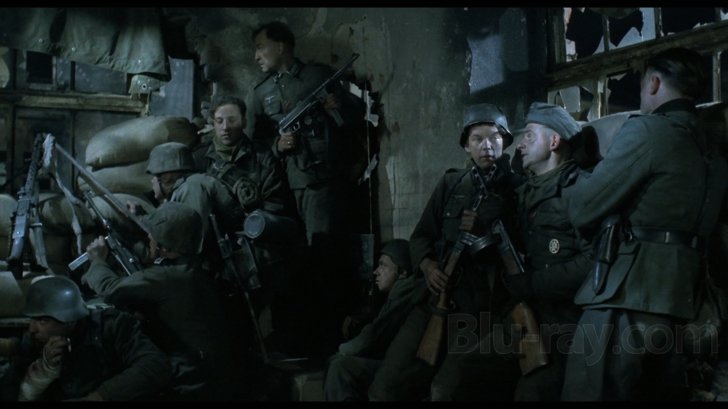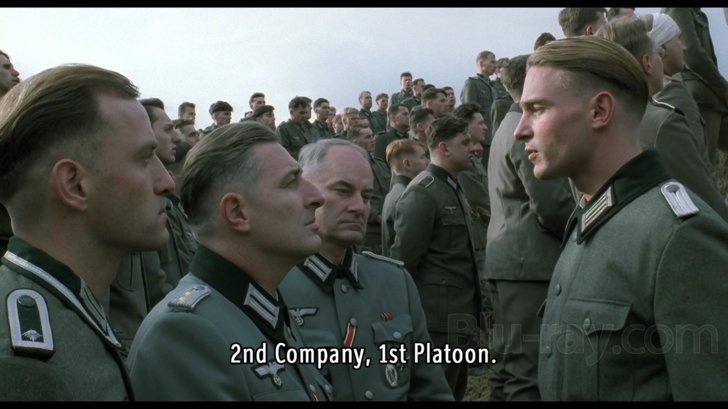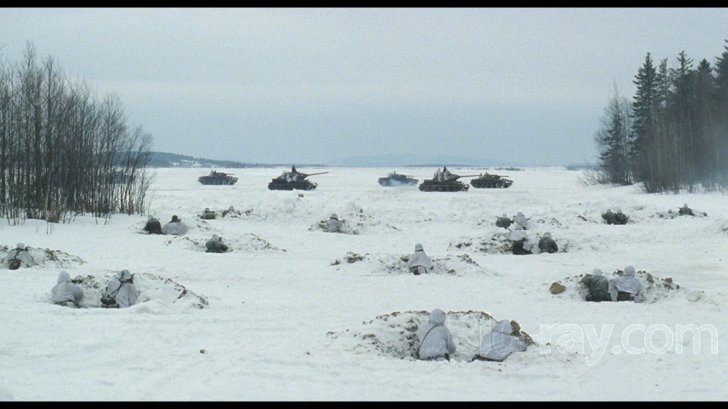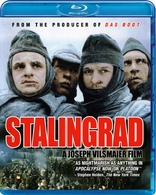Stalingrad Blu-ray Movie
HomeStalingrad Blu-ray Movie 
Hen's Tooth Video | 1993 | 138 min | Not rated | Jan 08, 2013Movie rating
7.4 | / 10 |
Blu-ray rating
| Users | 5.0 | |
| Reviewer | 4.0 | |
| Overall | 4.0 |
Overview
Stalingrad (1993)
German soldiers see a summer mission of 1942 turn hellish when the ferocious Russian winter sets in.
Starring: Dominique Horwitz, Thomas Kretschmann, Jochen Nickel, Sebastian Rudolph, Dana VávrováDirector: Joseph Vilsmaier
| War | Uncertain |
| Drama | Uncertain |
| Foreign | Uncertain |
Specifications
Video
Video codec: MPEG-4 AVC
Video resolution: 1080p
Aspect ratio: 1.85:1
Original aspect ratio: 1.85:1
Audio
German: DTS-HD Master Audio 2.0 (48kHz, 24-bit)
English: DTS-HD Master Audio 2.0 (48kHz, 24-bit)
Subtitles
English
Discs
50GB Blu-ray Disc
Single disc (1 BD)
Playback
Region A (locked)
Review
Rating summary
| Movie | 4.0 | |
| Video | 4.0 | |
| Audio | 4.0 | |
| Extras | 2.0 | |
| Overall | 4.0 |
Stalingrad Blu-ray Movie Review
No Guts, No Glory, No Heroes, No Survivors
Reviewed by Michael Reuben January 4, 2013There's an inherent risk in making an antiwar film that's genuinely entertaining. The more effectively a filmmaker draws viewers into what is supposed to be the hell of battle, the more he (or she) risks reproducing some version of the adrenaline rush that, as depicted in The Hurt Locker, can become its own form of addiction. Francis Ford Coppola wanted to show the madness of the Vietnam war in Apocalypse Now, but he couldn't avoid lionizing the two warrior-princes, Willard and Kurtz, who, at the end of the film, confront each other in a sort of mad battle of honor. And he couldn't resist delivering the thrilling imagery and memorable sound design that has home theater enthusiasts firing up their systems whenever the newest iteration of the film arrives in the latest format. In the same vein, Steven Spielberg wanted modern audiences to experience the infernal slaughterhouse of the Normandy invasion, but the opening of Saving Private Ryan is just as frequently played as "demo material" detached from its content. Viewers marvel at how the subwoofer shakes the room and the bullets fly across the surrounds, while hundreds of soldiers perish on the screen like so many toy figures. War may be hell, but it goes great with popcorn. Joseph Vilsmaier's Stalingrad provides an antidote, because, despite exceptional craftsmanship, it offers nothing seductive, sensual or glorious. It's depiction of battle is as downbeat and cynical as anything you're likely to find in movies, including Full Metal Jacket. Start with the bare facts of the underlying battle, which was fought from August 23, 1942 through February 2, 1943, between the armies of Germany and Russia and which did as much as any Allied effort in the west to turn the tide of World War II. The statistics, recited on title cards at the beginning and end of the film, are almost as numbing as the subzero temperatures faced by the combatants: over 1 million dead (killed in action, starved or frozen to death); of the 260,000 men in the German Sixth Army, 91,000 surrendered to the Russians, and most of the rest did not survive. Of those who surrendered, only 6,000 returned home many years later. Of course, no viewer is expected to sympathize with the Germans, but how many are likely to side with their opposition? If you're looking for someone to root for, Stalingrad offers you an unpalatable choice between Hitler's Nazis and Stalin's Bolsheviks. If there's a true hero of the story, it's Mother Nature, whose inhuman cold and relentless snows overwhelmed the unprepared German army and slowly froze them into submission. Under Vilsmaier's direction, Stalingrad observes the battles with the same indifferent gusto that Homer applied to the Greeks and the Trojans. The difference is that Homer was describing a conflict of heroes; Stalingrad depicts the fate of random pieces of cannon fodder that Hitler threw toward the east by the trainload, just because he wanted to make a statement (which he does, by radio, midway through the film).

Stalingrad falls roughly into three identifiable "acts". The first begins conventionally enough in Italy at Porto Cervo, where the Sixth Army is regrouping after fighting in North Africa. Here we are given cursory introductions to the handful of individuals whose fates have been selected, for narrative purposes, to represent those of all the German soldiers in the conflict. Chief among them is a newly promoted lieutenant, Hans von Witzland (a youthful Thomas Kretschmann, who would later become more familiar in such diverse roles as the merciful Nazi in The Pianist and the mysterious Cross in Wanted). Despite his promotion, von Witzland is green in battle. He has never before been on a frontline. A less educated but more experienced soldier, Rohleder (Jochen Nickel), who goes by the nickname "Rollo", offers him a bet on who will be the one to come home alive, with stakes set at two cases of water. Rollo isn't the brightest guy around; he has no plan for how to collect on the bet, even when his buddies point out the practical problem. Rollo also has a problem with authority. At an awards ceremony, his award is revoked when he refuses to button his collar. Otto (Sylvester Groth) is the resident cynic. Corporal Fritz Reiser (Dominique Horwitz) is something of a ladies man. Private Müller (Sebastian Rudolph), to whom Fritz gives the nickname "GG" because there are too many Müllers, is a baby-faced innocent. The English translation treats "GG" as short for "go-getter", but the German original is closer to "bad-ass", which is Fritz's attempt to buck up a frightened kid. As these men and thousands of others watch the Russian countryside pass outside the windows of their transport trains, they imagine their lives after the war with little awareness of what awaits them ahead. Under the command of Captain Musk (Karel Hemánek), the men join an assault on a heavily-defended Russian factory. It's the film's first major battle sequence, and it's random mayhem. Even an attempt at a negotiated cease-fire to attend to the wounded proves unsuccessful. After a variety of skirmishes, firefights and misadventures, a group of men commanded by von Witzland bring a badly wounded comrade to a makeshift field hospital, where there are no doctors. Furious, Fritz forces an orderly to attend to the injured man at gunpoint, and all of them are arrested. The second act of Stalingrad finds the arrested soldiers performing penal duty disarming land mines in the snow. But Captain Musk offers them a chance at redemption. By this point in the battle, the Soviet army has encircled the German forces, cutting off their supply lines, and the Russians are gradually closing their circle. Musk is determined to hold a position at the town of Marinovka, because he believes it is the best place to break through, but he needs additional manpower that the prisoners can provide. The film's second great battle involves men on foot armed with grenades, rifles and Molotov cocktails battling Soviet tanks by digging foxholes in the snow and letting themselves be run over. Musk's tactics are enough to redeem the disgraced soldiers but not enough to reverse the deteriorating tactical situation. Supplies continue to dwindle and morale with them. To conserve rations and remind the men of which side they're on, the officers force them to execute all of the Soviet prisoners. The victims include someone who helped Lieutenant von Witzland and his men, which makes the experience especially painful. The film enters its final act with the departure of the last German plane transporting wounded from the area. What follows is a steady, remorseless assault not by the enemy but by hunger and exposure. Still, moments of drama vary the ordeal. One is a final confrontation with a self-righteous officer who has been a recurring nemesis, Major Haller (Dieter Okras). Another is the discovery of a secret cache of German provisions diverted by a group of corrupt officers. The sight of loaves of bread, canned goods, sides of beef and other provisions stacked to the ceiling in a commandeered Russian residence while soldiers starve outside is both sickening and surreal, for they will do the German officers little good now. One man runs out of the house, only to encounter a top general marching under Russian guard with his hands up. The Sixth Army has surrendered. The overwhelmingly male cast has one major female character, a Russian fighter named Irina, played by Dana Vávrová, the director's wife. The German soldiers first encounter her as a member of a demolition team in the sewers beneath the factory they're fighting to take in their initial battle. Lieutenant von Witzland tries to take her prisoner, but she escapes. Later, the group finds her imprisoned with the cache of stolen provisions and calmly prepare to rape her in order of rank, but von Witzland won't allow it. Stalingrad has many such moments of random decency, but they don't amount to anything. They're swept away on a tidal wave of slaughter, and neither the perpetrator nor the beneficiary is better off.
Stalingrad Blu-ray Movie, Video Quality 

Hen's Tooth Video does not do its own transfers, but the master that has been supplied for Stalingrad is excellent. Hen's Tooth's 1080p, AVC-encoded Blu-ray reflects a clean source, impressive detail, and a superior balance of black levels and contrast that you very much appreciate when the weather turns wintry and many scenes are dominated by snow all around. (The production filmed in Finland to simulate the Russian winter.) Fine features of faces, uniforms and rubble are equally good in both dark areas (more common in the early parts of the film) and bright ones (more common after winter arrives). The film's palette switches from a dull, dingy earth-toned mix, dominated by military green, prior to the onset of winter, to a chilly mix of whites, grays and blues after the cold takes over. Strong, saturated colors are almost non-existent, because they would suggest too much vitality. The film has three credited cinematographers, which is probably due to the multiple locations. The film has been mastered on a BD-50. Compression and other artifacts were not in evidence. The only point to give one pause is that there's little visible evidence of a grain structure. Now, since there's also no indication that any fine detail has been scrubbed away—no waxy faces no loss of detail or other telltale signs of high-frequency filtering—this may be the film's authentic look, but that would certainly be unusual. If any degree of grain reduction has been applied, it has been done expertly, with the kind of high-end tools typically used in today's DI suites.
Stalingrad Blu-ray Movie, Audio Quality 

The Blu-ray for Stalingrad offers two soundtrack options, the original German language track and a dubbed English version. Both are provided as DTS-HD MA 2.0. While IMDb claims that Stalingrad was released in Dolby Digital, the claim is suspect given the fact that the film appeared just six months after the launch of DD in theaters. The film itself bears the Dolby Surround logo, and it's far more likely that this was the release format, in which case the lossless 2.0 version is correct. In any case, when the 2.0 soundtrack is played through a good surround decoder, it provides substantial environmental presence and even noticeable surround activity, especially in a sequence like that at the Pitomnik airport, where planes are taking off and banking. The artillery and tank fire of the battle scenes conveys an impressive sense of havoc. Although the bass extension isn't as deep as it would be with a dedicated LFE channel, it still makes enough of a statement that, combined with other registers, you experience the bombardment as an assault on the senses. My German is good enough to vouch for the clarity of the German dialogue; I did not sample the English track. The alternately military and tragic score by German composer Enjott Schneider is muddier than it would be with a discrete 5.1 mix, probably as a result of having to share two channels with all the sound effects, but it's still effective.
Stalingrad Blu-ray Movie, Special Features and Extras 

- Featurette: The Making of Stalingrad (SD; 1.33:1; 5:48): An EPK-like featurette for English-speaking audiences. The interviews with Vilsmaier and the principal cast are translated in voiceover rather than being subtitled. Even by EPK standards, the narration is annoyingly fulsome, but it contains relevant information. The behind-the-scenes shots of Soviet military hardware being transported to Finland are intriguing.
- Theatrical Trailer (SD; 1.66:1, non-enhanced; 1:54): The narration is in English.
- Teaser Trailer (SD; 1.85:1; 1:26): An alternate approach, using only music.
Stalingrad Blu-ray Movie, Overall Score and Recommendation 

Death comes in many forms in Stalingrad: the enemy, the elements, friendly fire, accident, misadventure, even suicide. Above all, it comes from the hubris that led to the misconceived and poorly planned siege in the first place. In a properly run military campaign, none of these men should have been there at all. "Otto, I'm not a Nazi!" protests the respected Captain Musk at one point. He means that he's really just a soldier, but Otto won't let him off the hook. "No", he replies, "you're worse, lousy officers. You went along, even though you knew who was in charge." Tough viewing, but a fine disc. Recommended.
Similar titles
Similar titles you might also like

Generation War
Unsere Mütter, unsere Väter
2013

The Bridge at Remagen
1969

Cross of Iron
1977

Land of Mine
Under Sandet
2015

Amen.
Der Stellvertreter
2002

City of Life and Death
南京!南京! / Nanjing! Nanjing!
2009

They Were Expendable
Warner Archive Collection
1945

Ice Cold in Alex
1958

A Walk in the Sun
1945

The Front Line
고지전 / Go-ji-jeon
2011

My Way
마이웨이 / Mai Wei
2011

The Water Diviner
2014

The World Wars
2014

Generation Kill
2008

The Thin Red Line
1998

9th Company
9 rota | Collector's Edition
2005

The Dirty Dozen
1967

A Bridge Too Far
1977

The Green Berets
1968

The Young Lions
Limited Edition to 3000 - SOLD OUT
1958
